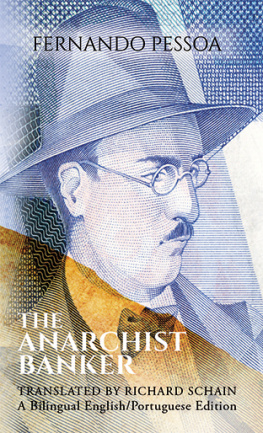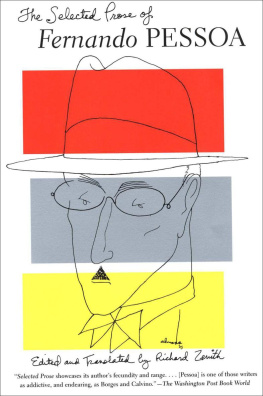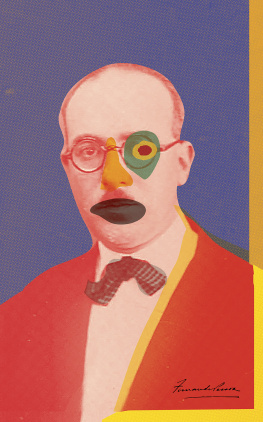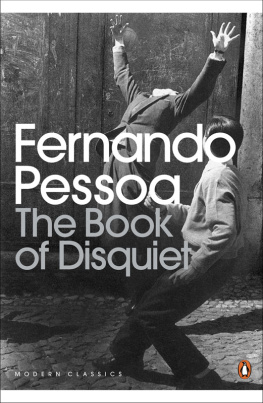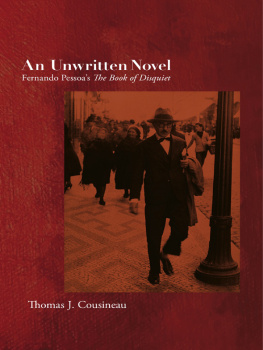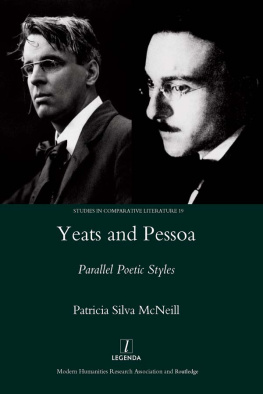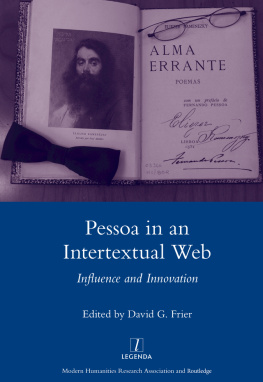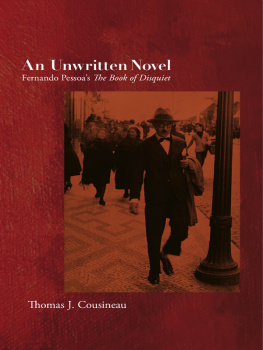Fernando Pessoa - The anarchist banker
Here you can read online Fernando Pessoa - The anarchist banker full text of the book (entire story) in english for free. Download pdf and epub, get meaning, cover and reviews about this ebook. year: 2018, publisher: Guernica Editions, Incorporated, genre: Art. Description of the work, (preface) as well as reviews are available. Best literature library LitArk.com created for fans of good reading and offers a wide selection of genres:
Romance novel
Science fiction
Adventure
Detective
Science
History
Home and family
Prose
Art
Politics
Computer
Non-fiction
Religion
Business
Children
Humor
Choose a favorite category and find really read worthwhile books. Enjoy immersion in the world of imagination, feel the emotions of the characters or learn something new for yourself, make an fascinating discovery.
- Book:The anarchist banker
- Author:
- Publisher:Guernica Editions, Incorporated
- Genre:
- Year:2018
- Rating:4 / 5
- Favourites:Add to favourites
- Your mark:
- 80
- 1
- 2
- 3
- 4
- 5
The anarchist banker: summary, description and annotation
We offer to read an annotation, description, summary or preface (depends on what the author of the book "The anarchist banker" wrote himself). If you haven't found the necessary information about the book — write in the comments, we will try to find it.
The anarchist banker — read online for free the complete book (whole text) full work
Below is the text of the book, divided by pages. System saving the place of the last page read, allows you to conveniently read the book "The anarchist banker" online for free, without having to search again every time where you left off. Put a bookmark, and you can go to the page where you finished reading at any time.
Font size:
Interval:
Bookmark:

The
ANARCHIST
BANKER
A new Interpretation
and a new English Translation
with the original Portuguese Edition
GUERNICA WORLD EDITIONS 8
FERNANDO PESSOA
The
ANARCHIST
BANKER

A new Interpretation
and a new English Translation
with the original Portuguese Edition
Introduction and Translation by
Richard Schain

TORONTO BUFFALO LANCASTER (U.K.)
2018
Copyright 2018, Richard Schain and Guernica Editions Inc.
All rights reserved. The use of any part of this publication, reproduced, transmitted in any form or by any means, electronic, mechanical, photocopying, recording or otherwise stored in a retrieval system, without the prior consent of the publisher is an infringement of the copyright law.
Michael Mirolla, editor
Cover design: Allen Jomoc, Jr.
Interior layout: Rafael Chimicatti
Guernica Editions Inc.
1569 Heritage Way, Oakville, (ON), Canada L6M 2Z7
2250 Military Road, Tonawanda, N.Y. 14150-6000 U.S.A.
www.guernicaeditions.com
Distributors:
University of Toronto Press Distribution,
5201 Dufferin Street, Toronto (ON), Canada M3H 5T8
Gazelle Book Services, White Cross Mills
High Town, Lancaster LA1 4XS U.K.
First edition.
Printed in Canada.
Legal DepositThird Quarter
Library of Congress Catalog Card Number: 2018938916
Library and Archives Canada Cataloguing in Publication
Pessoa, Fernando, 1888-1935, author
The anarchist banker : a new interpretation and a new English translation with the original Portuguese edition / Fernando Pessoa ; translated by Richard
Schain. -- First edition.
(Guernica world editions ; 8)
Issued in print and electronic formats.
Text in original Portuguese and in English translation.
ISBN 978-1-77183-332-5 (softcover).--ISBN 978-1-77183-333-2 (EPUB).-
ISBN 978-1-77183-334-9 (Kindle)
I. Schain, Richard, translator II. Pessoa, Fernando, 1888-1935. Banqueiro anarquista. III. Pessoa, Fernando, 1888-1935. Banqueiro anarquista. English. IV. Title. V. Series: Guernica world editions ; 8
PQ9261.P417B313 2018 | 869.3'41 | C2018-901880-1 |
C2018-901881-X |
Prose writings can be divided into certain categories according to the effect they have upon readers. The most common of these may be regarded as diversional in nature, that is writings which entertain or distract the reader with matters that have little to do with his or her own existence. There is enormous variability in diversional writings, ranging from romantic novels to the belles lettres of political criticism. Action novels, detective stories, science fiction, horror stories, and celebrity biographies or autobiographies are some of the genres that fall into this category of writing. The common denominator of this type of literature is its goal to divert the reader from the tensions or boredom of his own life.
A second type of literature is that designated as instructional since its purpose is to teach the reader something that will be useful in his life. Such are the so-called how to books, which rival diversional writings in their attraction to the reading public. These may range from instruction in the care of household pets to sermons on spiritual development. The complexity of modern life along with the joining of commerce to information products has provided fertile fields for writers with a knack for this type of literary effort. Under this category fall all didactic writings with political, economic, or religious messages.
A third category can be regarded as expressive in nature where the writer sets forth his feelings and ideas about human existence, existence in general, but primarily his own existence. Today, this is a rare genre, exposing the reader to a writers sense of the realities underlying surface appearances. It reveals the inner workings of the writers mind, of his soul if one may be permitted use of an archaic term. Reading expressive writings uncovers to the reader the writers soul, however one may conceive the nature of this mysterious entity.
At first exposure, The Anarchist Banker, written by the then obscure Portuguese writer Fernando Pessoa, and published in 1922 in the first issue of the Portuguese literary magazine Contempornea, would seem to fall into the first category. The Banker is presented as a one-dimensional personality, attached to logic to a degree that seems vaguely ludicrous. One wonders whether the author can be engaging in one of his famous blagues by creating a literary figure that is some kind of robotic being, acting upon his own unyielding logic without any acknowledgement of the ambiguities and uncertainties of human affairs.
This impression is heightened by the datedness for modern readers of many of the Bankers phrases, slogans, and arguments originating from the radicalism of that era. Outside of scholars and history buffs, there are few people interested in the debates conducted by the Iberian radical left before General Franco and Dr. Salazar finally put an end to them. Those who would like to put the views of the Banker in some historical perspective might view them as closer to those of the nineteenth century Berlin intellectual Max Stirner, who was a more radical anarchist than those of modern times. Also Stirners espousal of egoism (The Ego and Its Own) closely resembles that of the Banker. To my knowledge, however, there is no mention of Stirner in Pessoas writings. (A similar situation exists with regard to the resemblance of Nietzsches thought to those of Stirner.)
It would be erroneous, however, to think that Pessoa wrote this account for the entertainment, deception, or mystification of readers. This is a serious writing. In fact, it may be looked upon as a not so veiled commentary on the revolution in Russia, which had occurred a few years before Pessoa wrote this work. Like the Banker, Pessoa reveals in his unpublished prose writings a marked antipathy toward all collectivist movements. He does not distinguish much between political anarchism, socialism, and communism. He regarded them all as decadent influences, manifestations of a society in full disintegration (Obra de Fernando Pessoa, Vol. III Lello & Irmo, Porto, 1986, ed. Antnio Quadros).
The Banker, no doubt speaking for Pessoa, uncannily predicts the ultimate tyranny of the Dictatorship of the Proletariat that had been recently created by the Bolshevik takeover of the Russian Revolution. There can be little doubt that his intention was to produce a scathing parody of the organized collectivist movements of his time. But Pessoa is not sympathetic with the Banker either, as evidenced in his English writings on Millionaires, especially American ones (Selected Prose of Fernando Pessoa, Grove Press, New York, 2001). In these, his virulence rises to heights not usually seen with Pessoa: You are so completely a zoology of beasts that the gorge refuses to rise at you, out of direct organic contempt. You stink physically to the intellect. Your very philanthropy is an insult to those to whom you turn over, in checks, the leavings of the luck you have had.
Font size:
Interval:
Bookmark:
Similar books «The anarchist banker»
Look at similar books to The anarchist banker. We have selected literature similar in name and meaning in the hope of providing readers with more options to find new, interesting, not yet read works.
Discussion, reviews of the book The anarchist banker and just readers' own opinions. Leave your comments, write what you think about the work, its meaning or the main characters. Specify what exactly you liked and what you didn't like, and why you think so.

